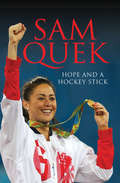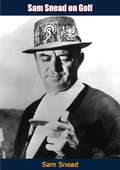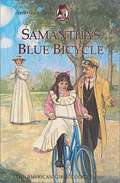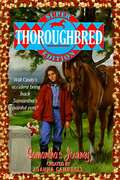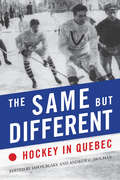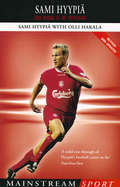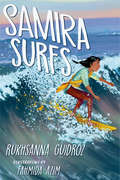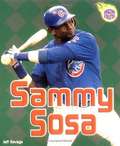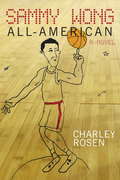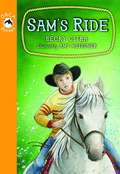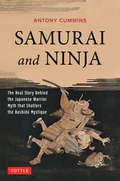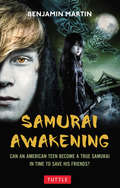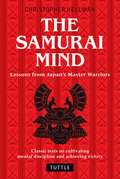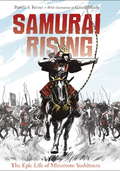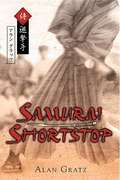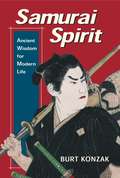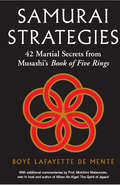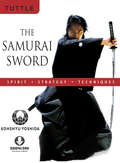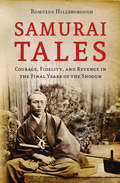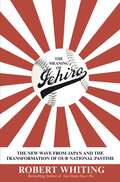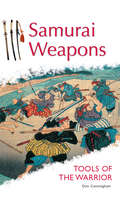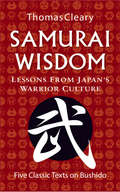- Table View
- List View
Sam Quek: Hope and a Hockey Stick
by Sam QuekSam Quek is mainly known for her starring role in the 2016 Olympic gold medal winning hockey team. This was the first time a British ladies team had won gold, but what is much less known is that Sams rise to the top of her spot was far from easy.Sam missed out on being part of Team GB at the London 2012 Olympics but competed for England at the 2013 EuroHockey tournament and 2014 Commonwealth Games, which she won silver medals. She won the gold at the 2016 Rio Olympics after the GB hockey team beat the Netherlands on penalties.How Sam overcame the bitter disappointment of being overlooked for the two previous Olympics and ensured that she wouldnt miss out again are revealed here for the first time. She also tells of her tough childhood and her battle to reach the heights that she has.She then went on to further fame by appearing in Im a Celebrity where she proved to be hugely popular with the viewing public, eventually finishing fourth.Sam now presents a variety of sports for TV, including men and womens football, NFL and hockey. She has been signed up to be the main presenter for the womens World Hockey Championships in 2018, held in August.She is hugely popular on social media with thousands of followers on twitter and instagram. Sam also has some very strong views on how women are portrayed in sport and their treatment by both coaches and the media. This is a hugely topical subject at the moment and promises to remain so for some time.
Sam Snead on Golf
by Sam SneadEver since Sam Snead was a kid, swishing a hickory stick at acorns, he has been talking about golf the way he plays it…in a natural, easy-going style.Now—the fabulous “Slammin’” Sam Snead demonstrates through word and picture, how you can swing into a relaxed game, lower scores and play better golf.Sam Snead is known as the golfer with the greatest swing in the history of the game. Here, his famous swing is captured in a series of action photos that give you a close-up look at each important motion.All of the difficulties suffered by the “weekend golfer”—erratic putting, poor chip shots, topped shots, shanking, weak pitch shots—are analyzed by Snead from fault to cause to cure. He explains what is wrong, why it happens and how you can correct it. Your game is bound to improve once you “blueprint” your mistakes the Sam Snead way.
Samantha's Blue Bicycle
by Valerie TrippSamantha is delighted with her new bicycle. Every time she rides it, her petticoats get tangled and she falls. Just when she plans to give up biking forever, Grandmary has an astonishing idea! In addition to a good story, this book contains historical notes on bicycles. Do you know why a bike was once called a boneshaker? An excellent book for a book report. If you'd like to taste some of the foods which Samantha might have eaten, snag "Samantha's Cookbook," also at Bookshare. You'll find other books about Samantha, too.
Samantha’s Journey (Thoroughbred Super Edition #6)
by Joanna CampbellSamantha McLean has a terrible scare when she sees Cindy, her adoptive sister, fall over Whitebrook's track rail during a workout. Cindy's accident is frighteningly similar to the one that caused Samantha's mother's death years earlier.
The Same but Different: Hockey in Quebec
by Jason Blake Andrew C. HolmanFrom coast to coast, hockey is played, watched, loved, and detested, but it means something different in Quebec. Although much of English Canada believes that hockey is a fanatically followed social unifier in the French-speaking province, in reality it has always been politicized, divided, and troubled by religion, class, gender, and language. In The Same but Different, writers from inside and outside Quebec assess the game’s history and culture in the province from the nineteenth century to the present. This volume surveys the past and present uses of hockey and how it has been represented in literature, drama, television, and autobiography. While the legendary Montreal Canadiens loom throughout the book’s chapters, the collection also discusses Quebecers’ favourite sport beyond the team’s shadow. Employing a broad range of approaches including study of gender, memory, and culture, the authors examine how hockey has become a lightning rod for discussions about Québécois identity. Hockey reveals much about Quebec and its relationship with the rest of Canada. The Same but Different brings new insights into the celebrated game as a site for community engagement, social conflict, and national expression.
Sami Hyypiä: From Voikkaa to the Premiership
by Okki Halala Sami HyypiaWhen Gerard Houllier took over as manager of Liverpool FC in 1999, his quest was to bring glory back to Anfield. His prime concern lay with strengthening his defence and to this end he made what is arguably one of his finest signings. Houllier targeted Sami Hyypiä, a relatively unknown player who was at the time captain of the Dutch team Willem II. This candid biography focuses on Hyypiä's eventful journey from the Finnish village of Voikkaa to the heights of the English Premiership, where he has become the inspirational leader of the Liverpool team. It charts his life from childhood and documents his astonishing rise in the game, from youth teams to Finnish senior sides Pallo-Peikot, KUMU and MyPa - as well as his international career - before moving on to his years in Holland and England playing for Willem II and Liverpool respectively. Hyypia reflects on past games in which he competed against the likes of Batistuta, Rivaldo, Van Nistelrooy and Henry, and recalls the Liverpool derbies in which he's played. He also shares his thoughts on the Reds' 2001 UEFA Cup campaign, in which they defeated the mighty Barcelona in the semi-finals before going on the defeat Deportivo Alavés 5-4 in the final to clinch the coveted trophy. In 2001-02 season, during which the team had to contend with the serious illness of their manager, Hyypiä led them to the quarter-finals of the Champions League and second place in the Premiership. Then, in season 2002-03, Liverpool won the Worthington Cup and narrowly missed out on a Champions League place. Featuring exclusive contributions from numerous former and current colleagues and teammates, including Gérard Houllier, Jari Litmanen and Michael Owen, Sami Hyppiä digs deep to reveal all about the man, his views on the game, and his hopes and plans for the future.
Samira Surfs
by Rukhsanna GuidrozA middle grade novel in verse about Samira, an eleven-year-old Rohingya refugee living in Cox's Bazar, Bangladesh, who finds strength and sisterhood in a local surf club for girls.Samira thinks of her life as before and after: before the burning and violence in her village in Burma, when she and her best friend would play in the fields, and after, when her family was forced to flee. There's before the uncertain journey to Bangladesh by river, and after, when the river swallowed her nana and nani whole. And now, months after rebuilding a life in Bangladesh with her mama, baba, and brother, there's before Samira saw the Bengali surfer girls of Cox's Bazar, and after, when she decides she'll become one.Samira Surfs, written by Rukhsanna Guidroz with illustrations by Fahmida Azim, is a tender novel in verse about a young Rohingya girl's journey from isolation and persecution to sisterhood, and from fear to power.
Sammy Sosa
by Jeff Savage"Slammin" Sammy Sosa is one of baseball's most exciting sluggers. A two-time home run champion, the Chicago Cubs right fielder is the only player to hit more than 60 home runs in a season three times. Sammy's all-out hustle and joyful style of play have made him a fan favorite throughout his career. Follow Sammy's amazing story as he goes from a childhood of poverty in the Dominican Republic to becoming one of baseball's biggest stars.
Sammy Wong, All-American
by Charley RosenSammy Wong, All-American tells the tale of a very talented Asian basketball player's rise and stumble in the all-American sport of basketball--among the most international of team sports, yet one where until very recently Asians were completely unrepresented. The novel unwinds in spectacular fashion. On his high school, college, and professional teams, Sammy isn't given much of a chance. Then when he does get into games, he turns out to be the kind of player who can turn a losing team into a winning one. Wong's career turns on chance opportunities and unexpected twists as much as on talent, persistence and hard work. There are great scenes describing pivotal plays on the hardwood floor as only Charley Rosen can. Like all Rosen's novels, this is about more than basketball. Sammy Wong, All-American is a book about identity in multi-ethnic American culture and the cost of innocence in the modern world. Sammy Wong, All-American will delight basketball fans and fiction readers alike, a sports novel that delivers on multiple levels.
Sam's Ride (Orca Books)
by Becky CitraSam overcomes his fear of horseback riding and comes to appreciate both his grandfather and life on the ranch.
Samurai and Ninja
by Antony CumminsThe myths of the noble Samurai and the sinister Ninja are filled with romantic fantasy and fallacy. Samurai and Ninja expert Antony Cummins shatters the myths and exposes the true nature of these very real-and very lethal-medieval Japanese warriors. The Samurai and Ninja were in fact brutal killing machines trained in torture and soaked in machismo. Many were skilled horsemen and sword-fighting specialists, while others were masters of deception and sabotage. Some fought for loyalty, others for personal gain. What these warriors all shared in common was their unflinching personal bravery, skill and brutality. In Samurai and Ninja, Cummins separates myth from reality and shows why the Japanese were the greatest warriors of all time: He describes the Samurai and the Ninja as they really were in earlier times when battles raged across Japan-not in later times when war became obsolete and Japanese warriors became philosophers, scholars and courtiers. He describes the social context of the day and the feudal world into which the warriors were trained to fight and die for their lords. He exposes the essentially brutal nature of warfare in medieval Japan. This book is illuminated by many rare Japanese manuscripts and texts which are translated into English for the very first time.
Samurai Awakening
by Ben MartinDavid Matthews is having a rough time. Being a teenager is bad enough, but when he picks up and moves to Japan for a year, with barely any knowledge of the language and none of the social behaviors of Japanese teenagers, things go from bad to worse.Until one day, David attends a temple ceremony and finds himself possessed by a Japanese god.Suddenly, he can understand and speak Japanese. He has unbelievable new powers, including the ability to shift into a tiger, and a powerful sword he can materialize at will from its sheath-his body. But nothing comes for free, and these changes bring David face-to-face with the most terrifying creatures of Japanese legend-vengeful okami, demonic oni and terrifying ghostly yurei.Trained by his host family, famous sword-makers and the keepers of an ancient secret entrusted to their family by the first Emperor of Japan, David must fight desperately to save his host sister from a hoard of Japanese monsters. Evil has returned to Japan, and David must overcome his own insecurities if he is to save her and become a True Samurai-the protector of Japan.
The Samurai Mind
by Christopher HellmanThe Samurai Mind is a collection of five seminal Japanese texts which together convey the very essence of the traditional samurai warrior ethos. These texts range from the ferocious to the esoteric--with their common thread being the importance of mastering one's own mind as the key to overcoming opponents. Written from the mid-18th to early 19th century, the authors were acknowledged master warriors keen to address a broader audience beyond their circle of students and acolytes. Their aim was to explain their craft to the outside world, and they do so with great insight.
The Samurai Mind
by Christopher HellmanThe Samurai Mind is a collection of five seminal Japanese texts which together convey the very essence of the traditional samurai warrior ethos. These texts range from the ferocious to the esoteric--with their common thread being the importance of mastering one's own mind as the key to overcoming opponents. Written from the mid-18th to early 19th century, the authors were acknowledged master warriors keen to address a broader audience beyond their circle of students and acolytes. Their aim was to explain their craft to the outside world, and they do so with great insight.
Samurai Rising: The Epic Life of Minamoto Yoshitsune
by Pamela S. Turner Gareth HindsMinamoto Yoshitsune should not have been a samurai. But his story is legend in this real-life Game of Thrones. This epic tale of warriors and bravery, rebellion and revenge, reads like a novel, but this is the true story of the greatest samurai in Japanese history. <P><P>When Yoshitsune was just a baby, his father went to war with a rival samurai family--and lost. His father was killed, his mother captured, and his brothers sent away. Yoshitsune was raised in his enemy's household until he was sent away to live in a monastery. He grew up skinny and small. <P>Not the warrior type. But he did inherit his family pride and when the time came for the Minamoto to rise up against their enemy once again, Yoshitsune was there. <P>His daring feats, such as storming a fortress by riding on horseback down the side of a cliff and his glorious victory at sea, secured Yoshitsune's place in history and his story is still being told centuries later.
Samurai Shortstop
by Alan GratzTokyo, 1890. Toyo is caught up in the competitive world of boarding school, and must prove himself to make the team in a new sport called besuboru. But he grieves for his uncle, a samurai who sacrificed himself for his beliefs, at a time when most of Japan is eager to shed ancient traditions. It's only when his father decides to teach him the way of the samurai that Toyo grows to better understand his uncle and father. And to his surprise, the warrior training guides him to excel at baseball, a sport his father despises as yet another modern Western menace. Toyo searches desperately for a way to prove there is a place for his family's samurai values in modern Japan. Baseball might just be the answer, but will his father ever accept a 'Western' game that stands for everything he despises? .
Samurai Spirit: Ancient Wisdom for Modern Life
by Burt KonzakNamed an Honor Title by the Storytelling World Awards in the category of "Storytelling Anthologies"The samurai prepared themselves for battle through physical practice, and the study of the arts. These ancient stories that inspired warriors so long ago have special significance for today's teens who face battles of their own: battles against bullies; battles with self-doubt and lack of confidence; and battles with the injustices they see around them. Burt Konzak has taught martial arts for over 20 years and has used these stories, drawn from sources including the Hagakuri, the Book of Five Rings, and other Japanese classics, to help young people gain emotional and mental strength.Whether or not readers are interested in the martial arts, they will find centuries of wisdom in this fine collection.From the Trade Paperback edition.
Samurai Strategies: 42 Martial Secrets from Musashi's Book of Five Rings
by Boye Lafayette De Mente Michihiro MatsumotoSimilar to The Art of War by Sun Tzu, The Book of Five Rings by Musashi Myamoto, Japan's most famous warrior and combat strategist, provides valuable lessons for anyone facing challenging circumstances--from business, war, and sports to fields of art, love, and politics.<P><P>The samurai culture, created over a period of nearly seven hundred years by Japan's ruling class of warriors and epitomized in The Book of Five Rings, still influences every facet of the Japanese way of thinking and doing things. Many Japanese, consciously and unconsciously, pattern their attitudes and behavior on the thinking and behavior of Musashi, including sacrificing themselves to ideals, and continuously striving to achieve perfection.Boyé Lafayette De Mente has extracted the fundamentals of Musashi's martial tactics and explains them here in a context for use in the modern world. These strategies for winning are as valid today as they were in 17th century Japan and provide valuable insights for anyone in any field to endeavor.This hardcover edition of Samurai Strategies features a new introduction by the author, and additional commentary in each chapter by renowned Japanese author and samurai expert Michihiro Matsumoto.
The Samurai Sword: Spirit * Strategy * Techniques
by Kohshyu YoshidaThe Samurai Sword is an indispensable guide to theory and practice that respects both the physical and spiritual aspects of martial arts practice with the samurai sword. Featuring guidance for selecting, maintaining and using your sword, it also delves into the practical value of meditation and provides brief, inspirational biographies of some of the greatest samurai, men whose words and deeds embodied the true spirit of the samurai warrior.Written by a descendant of samurai warriors, The Samurai Sword provides both a strong, hands-on foundation for beginners and advice for the practiced swordsperson.
The Samurai Sword: Spirit * Strategy * Techniques
by Kohshyu YoshidaThe Samurai Sword is an indispensable guide to theory and practice that respects both the physical and spiritual aspects of martial arts practice with the samurai sword. Featuring guidance for selecting, maintaining and using your sword, it also delves into the practical value of meditation and provides brief, inspirational biographies of some of the greatest samurai, men whose words and deeds embodied the true spirit of the samurai warrior.Written by a descendant of samurai warriors, The Samurai Sword provides both a strong, hands-on foundation for beginners and advice for the practiced swordsperson.
Samurai Tales: Courage, Fidelity and Revenge in the Final Years of the Shogun
by Romulus Hillsborough Kiyoharu OminoSamurai Tales is about the legendary men from the samurai class who fought for the helm of power in 19th century Japan.<P><P> These are stories of courage, honor, fidelity, disgrace, fate, and destiny set in the bloody time of political change and social upheaval in the final years of the Shogun. Samurai Tales is, to quote author Romulus Hillsborough, "accurate portrayals of the heart and soul of the samurai, the social and political systems of whom have, like the Japanese sword, become relics of a distant age, but the likes of whose nobility shall never again be seen in this world." In recounting what he terms "the great epic which was the dawn of modern Japan," Hillsborough delves deeply into the psyche of the men of the samurai class. This book would serve well on the bookshelves of martial artists, those interested in samurai culture, or those interested in Japanese history.
The Samurai Way of Baseball: The Impact of Ichiro and the New Wave from Japan
by Robert WhitingMatsui... Nomo... Sasaki... Ichiro... the so-called American "National Pastime" has developed a decidedly Japanese flair. Indeed, in this year's All-Star game, two of the starting American League outfielders were from Japan. And for the third straight year, Ichiro - the fleet-footed Seattle Mariner - received more votes for the All-Star game than any other player in the game today. Some 15 years ago, in the bestseller "You Gotta Have Wa," Robert Whiting examined how former American major league ballplayers tried to cope with a different culture while playing pro ball in Japan. Now, Whiting reverses his field and reveals how select Japanese stars have come across the Pacific to play in the big leagues. Not only have they had to deal with the American way of life, but they have individually changed the game in dramatic fashion.
Samurai Weapons
by Don CunninghamWeapons, particularly bladed ones such as swords, are enjoying a renaissance of interest from every source, from collectors to laypeople. The samurai, a glorified figure in Japan and the West, employed a variety of weapons, not least of which was the sword. Samurai Weapons details how and why their arsenal included not only the sword of popular lore, but also a variety of other tools, including concealed weapons, improvised fighting tools, fans, truncheons and pole arms.The author succinctly describes the society of Japan, how and why the samurai class arose, and the place that samurai held in that society through the centuries, focusing in particular on the various weaponry, how these weapons were used and why. In addition, Samurai Weapons highlights the influence these weapons and fighting styles had on many different schools of Japanese martial arts.
Samurai Weapons
by Don CunninghamWeapons, particularly bladed ones such as swords, are enjoying a renaissance of interest from every source, from collectors to laypeople. The samurai, a glorified figure in Japan and the West, employed a variety of weapons, not least of which was the sword. Samurai Weapons details how and why their arsenal included not only the sword of popular lore, but also a variety of other tools, including concealed weapons, improvised fighting tools, fans, truncheons and pole arms.The author succinctly describes the society of Japan, how and why the samurai class arose, and the place that samurai held in that society through the centuries, focusing in particular on the various weaponry, how these weapons were used and why. In addition, Samurai Weapons highlights the influence these weapons and fighting styles had on many different schools of Japanese martial arts.
Samurai Wisdom
by Thomas ClearyOne of the best known translators of the wisdom of Asia, Thomas Cleary now adds a new book to his samurai canon with Samurai Wisdom, new translations of five classic works on bushido. His previous works, Code of the Samurai and Soul of the Samurai, focused on the practical aspects and the more spiritual, Zen side of the samurai, respectively. Samurai Wisdom, authored by the scholar Yamaga Soko or his disciples, provides the core ideals and lessons that taught the samurai how to lead a proper life under the martial philosophy of bushido.Yamaga's writings inspired the transformation of the samurai from a feudal warrior class to a group with great intellectual, political and ethical leadership and influence. The classic works translated in Samurai Wisdom, despite being over 400 years old, are as timeless and applicable today as Sun Tzu's famous work, The Art of War.
